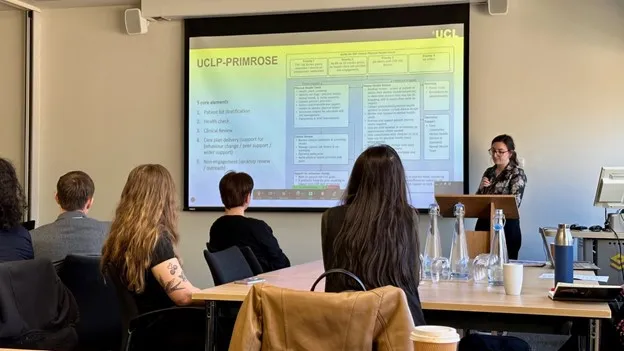
Held on Wednesday, March 19 at College Court, the event welcomed delegates from across the UK to delve into the key findings from the four ARC MLTC Implementation Programme projects.
Organised by NIHR ARC East Midlands, the session featured a series of interactive workshops focused on public and patient involvement and engagement, fostering collaboration across the NIHR, advancing knowledge mobilisation strategies, and examining the NHS 10-year plan and its significance for research and practice in MLTC.
A public contributor view
By Amanda Threlfall
The day started with a welcome from Professor Kamlesh Khunti, ARC East Midlands Director and Theme Lead for MLTC. This programme received £1.8 million funding from the NIHR and consisted of four national projects:
- Implementation evaluation of UCLP-PRIMROSE: A care innovation to reduce physical health inequalities for patients with severe mental illness
- PP4M Personalised annual reviews for patients with multiple long term conditions: An implementation study
- The MONITORY study: a cluster randomised trial
- Impact of structured medication reviews on prescribing and workload in English Primary Care.
Information on these projects can be found in this blog post.
Of particular interest to me was the keynote presentation by Dr. Natalie Owen, Head of NIHR Research Infrastructure, Department for Health and Social Care; Tackling the Big Health Challenges: the NHS 10-year plan.
The results of this will cover three areas:
- Hospital to community
- Analogue to digital
- Sickness to prevention.
These are supported by seven pillars which aim to restore stability, increase investment and reform the economy to drive up productivity, prosperity and living standards. I found Dr Owen’s presentation accessible and engaging, and it struck a perfect balance for the professionals, researchers and public contributors in the room. The four national project outcomes were presented by the researchers.
Interactive Workshops
After the lunch break delegates had the choice of four workshops:
- PPIE
- Collaborations
- Knowledge Mobilisation
- NHS 10-year plan.
As a member of the PPIE team I joined the PPIE workshop. I was disappointed it clashed with the NHS 10-year plan. The workshop was hosted by Christine Smith and with fellow public contributor Pauline Mountain we had a varied debate about PPIE involvement challenges from the perspective of the researcher.
Topics we covered included how much is too much to contact PPIE members, such as with updates, or requests. It was an enjoyable session and good to discuss how to make PPIE and co-production more meaningful.
The feedback from the groups highlighted common themes in engagement with patients and carers. I think that the presence and voice of myself and Pauline raising awareness of carers helped with this being recognised and acknowledged by the researchers.
Reflections
It was the first time I had attended a research dissemination event and it was an interesting experience. I came away with lots of acronyms for a glossary of research terms for members of the public.
It’s notable that even in framing the context of this blog post there are already three acronyms that needed defining. With experience of being involved the language of research becomes more familiar which has pros and cons.
It makes it easier to understand the discussions and interrupt less to ask for definitions, but the flip side of this is that it further embeds the use of technical rather than publicly accessible language.
To read the full blog, click here.
